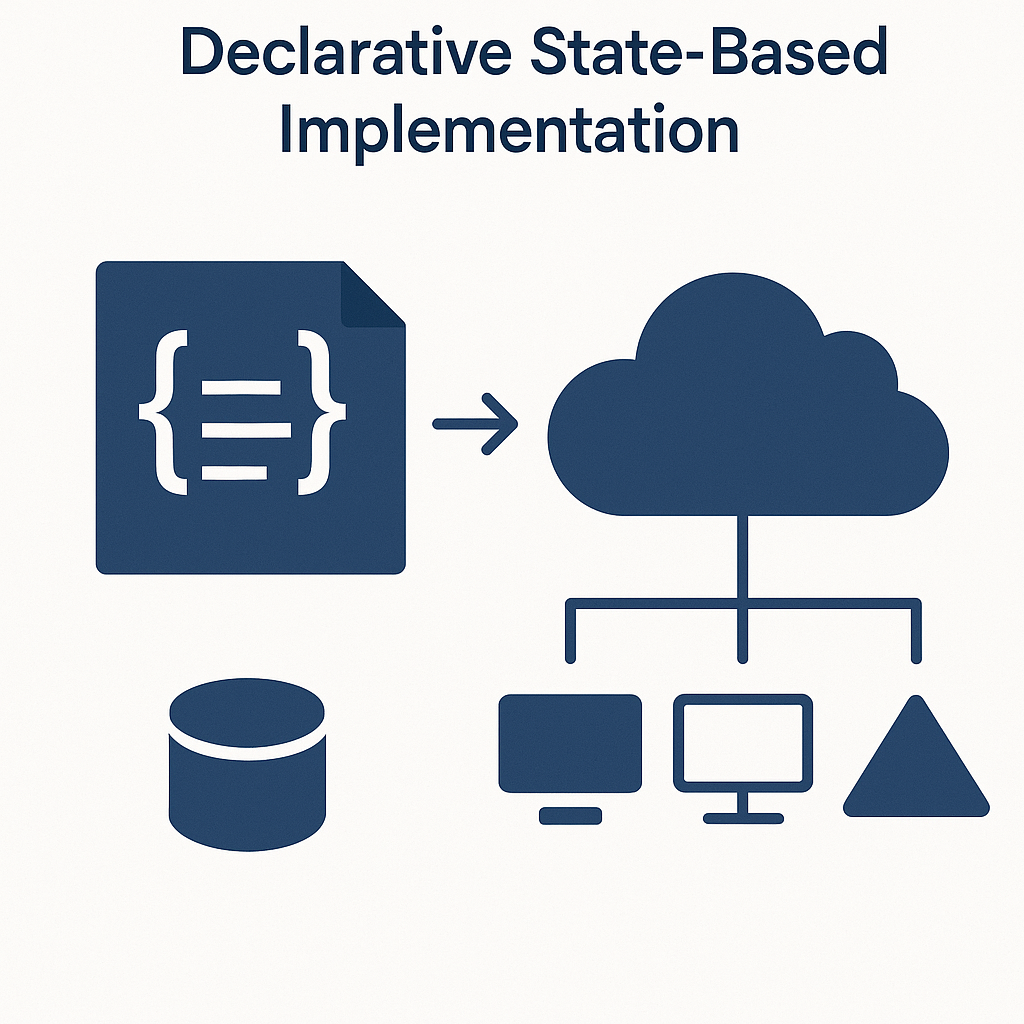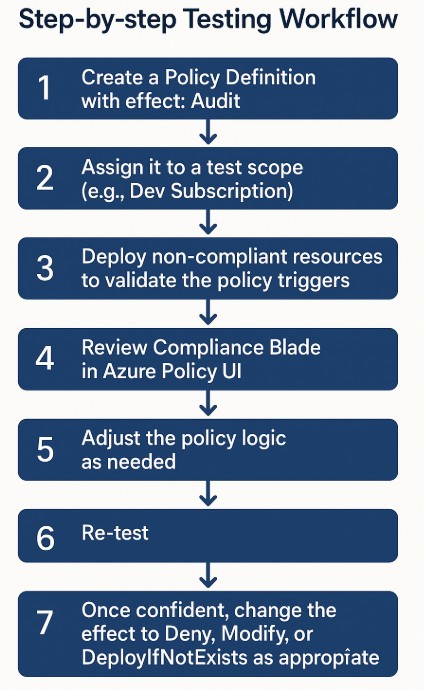So, What’s Azure Policy?
Azure Policy is a service that allows administrators to create, assign, and manage policies to enforce rules and standards for Azure resources. These policies help ensure resources remain compliant with corporate standards, regulations, and best practices.
Key Components
- Policy Definition: Specifies conditions under which policy enforcement occurs. Each definition includes logic and an “effect” (Audit, Deny, DeployIfNotExists, Modify, etc.).
- Policy Assignment: Connects a policy definition to a specific scope (e.g., management group, subscription, or resource group).
- Policy Initiative: Groups multiple policy definitions into a single assignment.
Dependencies of Azure Policy
When implementing Azure Policy, several dependencies and considerations are crucial:
- Resource Manager: Azure Policy is built on Azure Resource Manager (ARM), which handles resource provisioning, management, and organization.
- Role-Based Access Control (RBAC): RBAC permissions must be appropriately configured to create and manage policies.
- Compliance Evaluation: Azure Policy relies on the Azure Policy Compliance Blade to monitor and report compliance status.
- Log Analytics and Azure Monitor: For enhanced visibility, integration with Azure Monitor and Log Analytics is recommended to track policy violations and changes.
Association with Declarative State Computing
Declarative state computing involves defining the desired state of resources rather than explicitly scripting procedures to create or manage them. Azure Policy exemplifies this approach by:
- Defining the desired state through policy definitions.
- Automatically evaluating and enforcing this state across cloud resources.
- Allowing for continuous compliance through automation and policy-driven remediation actions.
This contrasts with imperative models, where explicit commands or scripts manage resource states step-by-step.
Declarative Approach Benefits:
- Consistency: Ensures resources adhere to the defined configurations and compliance standards automatically.
- Simplicity: Reduces manual configurations and maintenance overhead.
- Automation: Simplifies complex governance tasks by automating compliance checks and remediation actions.
Declarative state-based computing involves writing, reviewing, testing, and uploading code to the cloud with the sole purpose of declaring the intended state of the deployed resources. This ensures that the actual state continuously matches the predefined, desired state through automatic enforcement mechanisms provided by cloud services.

Why Testing Your Policy Matters
Policies are powerful but blunt instruments when not handled properly. A policy that denies too broadly can break app deployments. One that audits incorrectly can lead to false compliance alerts.
Before enforcing a policy:
- Start with ‘Audit’ mode: This ensures nothing is blocked while you evaluate.
- Test in lower environments: Validate policy behavior in Dev or QA subscriptions.
- Monitor policy effects: Use Azure Activity Logs and Compliance reports to observe behavior.
Executing Policy Testing
Step-by-step Testing Workflow:

Tip: Use Azure Policy’s “What If” tool to simulate policy evaluation without actual deployment.
So, in reality do things go smoothly every day, probably not. In the event something goes wrong, we will need to do some discovery. And because its Microsoft in 2025, there are alot of things that can go wrong, so here we are.
Troubleshooting Azure Policy involves a structured approach to identify, diagnose, and resolve issues related to policy compliance and enforcement. Here are detailed steps and techniques for effective troubleshooting:
1. Utilize the Policy Compliance Blade
- Regular Monitoring: Regularly review the Azure Policy Compliance Blade within the Azure portal to identify resources that are non-compliant and to understand the reason for non-compliance.
- Detailed Compliance Reports: Leverage detailed compliance reports to pinpoint exactly which resources violate specific policy conditions.
2. Analyze Azure Activity Logs
- Event Tracking: Review Azure Activity Logs to trace policy assignments, modifications, and compliance evaluations.
- Identify Evaluation Failures: Look specifically for failed policy evaluations or unexpected outcomes, noting timestamps and error details to determine if there are systemic issues or isolated incidents.
3. Use Azure Resource Graph Explorer
- Resource Queries: Run queries in Azure Resource Graph Explorer to quickly and efficiently investigate the current state of resources and their attributes.
- State Validation: Confirm whether resources meet expected configurations as defined in your policies, identifying deviations or configuration drift.
4. Review Policy Definitions and Logic
- Syntax and Logic Checks: Verify policy definitions for accuracy, including syntax correctness and logical consistency.
- Update Policy Rules: Regularly update your policy rules to reflect changes in your organization’s compliance requirements or in Azure resource structures and configurations.
5. Test in Controlled Environments
- Isolated Testing: Conduct rigorous testing of policy definitions in isolated or test environments before deploying to production.
- Iterative Refinement: Use test results to iteratively refine policy logic and ensure accurate enforcement.
6. Leverage Azure Diagnostics and Logs
- Diagnostics Settings: Configure diagnostics settings to collect detailed logs related to Azure Policy.
- Insights and Analytics: Integrate Azure Policy diagnostics logs with Azure Monitor or Log Analytics for advanced analysis and reporting, identifying trends and recurring issues.
7. Common Issues and Solutions
- Permissions Issues: Ensure proper RBAC permissions are granted to roles responsible for creating, managing, and enforcing policies.
- Scope and Exclusions: Verify correct scopes and exclusions are set in policy assignments to avoid unintended enforcement or compliance checks.
- Resource Provider Registration: Confirm that necessary resource providers are registered in your Azure subscription to avoid policy evaluation errors.